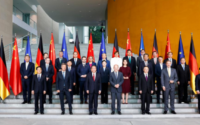Politics and economy should be separated in Mekong 2023
Cambodian and Laotian migrant laborers fear expulsion by the Thai government.
Thailand expelled 200,000 Cambodian laborers in June 2014 after the May 22 military coup, therefore the worries are justified. Cambodian expulsions were deemed “uncivilized and inhumane” by Adhoc.
A nationalist approach would undermine both economies.
It may seem like just Cambodians would suffer, but such a strategy would cripple the Thai economy. As Thailand’s economy becomes more skill-based and less labor-intensive, Cambodian, Laotian, and Myanmar employees are undertaking menial occupations Thais no longer want.
These employees enable Thai people to live better and flourish, therefore governments should appreciate and thank them. Instead of fanning economic nationalism to win political support, they should appreciate those who support their livelihoods and economic roots.
It’s crucial to remember the ideals of the Association of Southeast Asian Nations Declaration on the Protection and Promotion of Migrant Workers (the Cebu Declaration) and the ASEAN Consensus.
These established rights for migrant workers and their families and acknowledged the shared and balanced obligations of ASEAN’s receiving and sending governments to promote their full potential, dignity, fundamental rights, and fair treatment.
Responsible leaders in the Mekong Region should avoid measures that might harm locals. They must separate business and politics.

Cambodian officials’ behavior is even more disturbing.
For instance, notorious opposition figure Sam Rainsy has made a name for himself by inciting military mutiny and insurrection to overthrow the government.
He hates China and Vietnam. His group’s advocacy drive to get the EU and US to revoke Cambodia’s Everything But Arms (EBA) and Generalized System of Preferences (GSP) special privileges is most worrying. They want foreign politicians to impose economic conditions to affect Cambodia’s political growth.
It’s predicted to hit the apparel industry hardest. However, losing the livelihoods of approximately 800,000 workers in this sector, mostly women, to gain political leverage by undermining the economy and removing government backing would be like burning the house to cook an egg.
Former Thai leaders Thaksin and Yingluck Shinawatra never advocated for other countries to put sanctions on Thailand’s economy, despite voicing political complaints after being exiled.
Despite being imprisoned and her unshakable commitment to overthrowing the military dictatorship, Aung San Suu Kyi never called on foreign nations to harm Myanmar’s economy before or after seizing office.
Even though China and Vietnam often appear like they’re going to fight a war tomorrow over the South China Sea conflicts, their officials have seldom sought to destroy their strong economic connections.
Last year, bilateral commerce between Vietnam and China reached US$234.9 billion, more than twice the 2018 record of $106.71 billion. Vietnam is China’s top ASEAN commercial partner and sixth-largest internationally.
China and Vietnam believe that economic and people-to-people relationships may protect peace from unanticipated conflicts, thus they have deepened their economic cooperation.
Mekong politicians must separate politics and economy.
No matter how severe their political disputes, they should never encourage foreign countries to apply economic sanctions against their own country. Politicians should not jeopardize the lives and well-being of the region’s interdependent people, regardless of their political disagreements across the border.
Politicians should encourage peace, stability, good neighborliness, and shared wealth.



